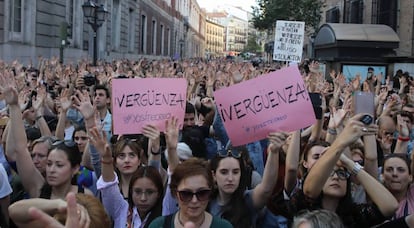Spain approves sweeping sexual violence protection bill: ‘We don’t want any woman to feel alone’
The future ‘Only Yes Means Yes’ law will consider sex acts without explicit consent as rape, and provide financial assistance to victims of abuse
The Spanish Cabinet on Tuesday greenlighted a sweeping bill to provide comprehensive protection and assistance to victims of sexual violence in all of its forms.
Coming in at 113 pages and known popularly as the “Only Yes Means Yes” law, this new piece of legislation will likely go to parliament for consideration in September.
The bill represents a change of paradigm in Spain as the existence of a sex crime will be defined by a woman’s explicit consent (or lack of it), and not so much by the victim’s attitude – whether she put up resistance or was passive.
Under the bill, street harassment is considered a crime punishable with house arrest or community service
Spain already has punishment for non-consensual sex acts, but there is no definition of consent in the criminal code, which requires proof that violence or intimidation were used to determine the existence of rape.
The new bill does not define what is not consent, but rather what is: “Consent will only be understood to exist when it has been freely manifested through acts clearly expressing the individual’s will, considering the circumstances of the case.” This notion has been popularly expressed as solo sí es sí or “only yes means yes.”
In another first, the bill considers street harassment a crime punishable with house arrest or community service. It will be considered a minor offense to “address another person with expressions, behavior or propositions of a sexual nature that create an objectively humiliating, hostile or intimidating situation for the victim,” who will have to file a complaint. Sources in the Equality Ministry said that “it’s not about someone calling you beautiful as you’re walking down the street, or about a random man’s misplaced comment. We’re talking about your daughter standing in line at the bank, and the guy ahead of her starts masturbating in her face.”

“The goal is clear: for no woman to feel alone,” said Equality Minister Irene Montero, of the leftist Unidas Podemos party, which is the junior partner in Spain’s coalition government.
The legal initiative builds on the experience of a high-profile case involving five men who raped a woman at the 2016 Running of the Bulls festival in Pamplona. The case – known as “La Manada” (The Wolf Pack) after the WhatsApp group that the men used to chat and boast about their sexual exploits – triggered widespread protests and prompted calls for a reform of the criminal code. The future law eliminates the concept of sexual abuse, as recommended by experts advising the government at the time of the La Manada scandal, when a court found the five men guilty of abuse but not of the more serious assault (the equivalent of rape) because the judges did not find evidence of intimidation or violence. The Supreme Court later overturned that decision.
One of the key elements of the bill is the victim’s “right to reparation.” Lawmakers have rolled out a series of resources for victims of sexual violence, including some that were until now being used for victims of gender violence. There will be financial aid in the form of the equivalent of six months of unemployment benefits for victims who earn less than the minimum salary. The aid will increase if the victim has a disability or is taking care of dependents. Victims should also have preferential access to public housing.

The bill also contemplates action against digital sexual violence, genital mutilation, forced marriages and trafficking of women. Individuals who are sentenced to more than five years in prison for sexual violence against minors or people with disabilities will not be eligible for semi-open prison regimes unless they undergo a treatment program for sex offenders.
The new legislation includes a section on conduct that favors prostitution – which is not addressed by any specific law in Spain. The bill punishes “non-coercive pimping” as well as the owners of establishments where prostitution takes place.
Age-appropriate sex education programs are planned for all school levels, and the bill recommends that regional governments develop university training programs for future teachers to help them detect sexual violence in the classroom.
Under the future legislation, there will be an official effort at data collection on different forms of sexual violence “in order to give them visibility,” according to the Equality Ministry.
English version by Susana Urra.
Tu suscripción se está usando en otro dispositivo
¿Quieres añadir otro usuario a tu suscripción?
Si continúas leyendo en este dispositivo, no se podrá leer en el otro.
FlechaTu suscripción se está usando en otro dispositivo y solo puedes acceder a EL PAÍS desde un dispositivo a la vez.
Si quieres compartir tu cuenta, cambia tu suscripción a la modalidad Premium, así podrás añadir otro usuario. Cada uno accederá con su propia cuenta de email, lo que os permitirá personalizar vuestra experiencia en EL PAÍS.
¿Tienes una suscripción de empresa? Accede aquí para contratar más cuentas.
En el caso de no saber quién está usando tu cuenta, te recomendamos cambiar tu contraseña aquí.
Si decides continuar compartiendo tu cuenta, este mensaje se mostrará en tu dispositivo y en el de la otra persona que está usando tu cuenta de forma indefinida, afectando a tu experiencia de lectura. Puedes consultar aquí los términos y condiciones de la suscripción digital.








































